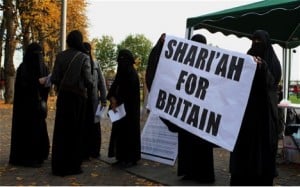Yet another Muslim woman has been denied the right to play sports while wearing a headscarf.

Last summer, a young Swiss Muslimah from Luzern, Surah al Shawk (pictured left), attracted the attention of the Northeastern Swtizerland Basketball Association, ProBasket, when she started playing in second division games in Luzern. Unfortunately, it wasn’t her amazing skills on the court that grabbed their attention–it was her headscarf. Her veil had never caused any problems at the community level, before her talent led her to the big leagues. Probasket stated that according to International Basketball Federation (FIBA) rules, headscarves cannot be worn during games, both in the need for sporting events to be “religiously neutral” and also in case of injury. ProBasket’s position was later confirmed by FIBA. Her appeal to ProBasket was based on the grounds of breach of personality, which the district court ruled against this week.
She now can appeal to the Swiss Supreme Court…or just take off her veil on the court. At the time, Ms. al Shawk’s case made headlines in the German part of Switzerland, including full page spreads in the Basler Zeitung and the Tages Anzeiger, as well as in Geneva’s French language daily Le Temps. At the time, most of the major parties, with the exception of the UDC (the party behind the “minaret” vote), questioned whether even the extra-parliamentary Federal Commission Against Racism cited ProBasket for its unequal treatment of the athlete when the affair first broke in June.
Now as the verdict has fallen in “post-minaret” Switzerland, the question of religious freedom for Muslims has the potential to make headlines again. Luckily, the positions taken in June by the various actors cited previously appear to stand. With the notable exception of FIBA, who has dropped the religious symbol argument in favor of simply mentioning that head coverings are not part of the official uniform. As another French-language article, this time in December from 24 Heures pointed out, first and foremost, FIBA rules ban head coverings. According to the president of Swiss Basketball, François Stempfel, “Nowhere do the FIBA regulations refer to religious symbols,” noting that the the FIBA rules on head coverings apply simply to uniform regulations. He goes on to say that, after last fall’s anti-minaret vote, Swiss Basketball regrets that the “the emotional context [of Ms. al Shawk’s case] no longer allows for a calm debate.”
For an interview on Friday in French-language daily Le Matin, Ms. Al Shawk, answered a few questions, including a few regarding the recent minaret vote:
Do you feel integrated in Switzerland?
Yes, I am integrated. I go to school. I try to do the best possible in my studies. I only have two Muslim friends. The others are all Swiss or from other backgrounds. They accept me as I am. And I accept them as they are.
Do you have other problems with this veil? At school, the pool or in restaurants?
Yes, the pool, it was very complicated. But this is not a very important activity for me, so I just don’t do it. It [the pool] is the only problem that I encounter. Looking for a job will probably also be complicated. But I have a friend who does not wear a veil and the job hunt is complicated for her as well. And then, the question is a non-issue at this time. I want to go to university in economics or international relations.
Do you find Switzerland intolerant?
Ten years ago, when I arrived in Switzerland, I do not think so. I was convinced that religious freedom was guaranteed. But now I realize that many Swiss are pretending to be tolerant. I’d say it’s 50-50. Half the population is liberal and the other half is conservative.
What did you think of the anti-minaret vote?
Many people did not understand what they were voting for. They were already visualizing minarets that make the call to prayer five times a day … People voted out of fear.
A part-time hijabi myself, I still understand Sura al Shawk’s position of not wanting to take hers off. When dealing with people who like to dictate what women should where and when, the more time you spend with your headscarf off, the more time you waste explaining to people when it is on (“Well, if you take it off at the pool, surely you can take it off for Great Uncle Elmo’s barbecue on Sunday!”).
And while I don’t claim to be an expert in sports injuries or FIBA rules, most of the press pictures show her in a tight wrap. I don’t buy the “potential cause of injury argument” which could hold water if she was trying to defend a center or dribble between her legs in a jilbab. Although FIBA and ProBasket have backpedaled due to the pending litigation, I also don’t buy the “religious symbols” argument when you think about the fact that tattoos are allowed by FIBA, and I can count on two hands and two feet the number of tatted-up crosses I have seen on NBA players allowed to play for national teams under FIBA rules.
I don’t have an a priori for or against headscarves or crosses, I just don’t get the double standard. Is this about FIBA uniform rules or Muslims?











